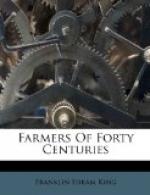The application of soil as a fertilizer to the fields of China, whether derived from the subsoil or from the silts and organic matter of canals and rivers, must have played an important part in the permanency of agriculture in the Far East, for all such additions have been positive accretions to the effective soil, increasing its depth and carrying to it all plant food elements. If not more than one-half of the weight of compost applied to the fields of Shantung is highly fertilized soil, the rates of application observed would, in a thousand years, add more than two million pounds per acre, and this represents about the volume of soil we turn with the plow in our ordinary tillage operations, and this amount of good soil may carry more than 6000 pounds of nitrogen, 2000 pounds of phosphorus and more than 60,000 pounds of potassium.
When we left our hotel by ricksha for the steamer, returning to Shanghai, we soon observed a boy of thirteen or fourteen years apparently following, sometimes a little ahead, sometimes behind, usually keeping the sidewalk but slackening his pace whenever the ricksha man came to a walk. It was a full mile to the wharf. The boy evidently knew the sailing schedule and judged by the valise in front, that we were to take the out-going steamer and that he might possibly earn two cents, Mexican, the usual fee for taking a valise aboard the steamer. Twenty men at the wharf might be waiting for the job, but he was taking the chance with the mile down and back thrown in, and all for less than one cent in our currency, equivalent at the time to about twenty “cash”. As we neared the steamer the lad closed up behind but strong and eager men were watching. Twice he was roughly thrust aside and before the ricksha stopped a man of stalwart frame seized the valise and, had we not observed the boy thus unobtrusively entering the competition, he would have had only his trouble for his pains. Thus intense was the struggle here for existence and thus did a mere lad put himself effectively into it. True to breeding and example he had spared no labor to win and was surprised but grateful to receive more than he had expected.
XI
ORIENTALS CROWD BOTH TIME AND SPACE
Time is a function of every life process, as it is of every physical, chemical and mental reaction, and the husbandman is compelled to shape his operations so as to conform with the time requirements of his crops. The oriental farmer is a time economizer beyond any other. He utilizes the first and last minute and all that are between. The foreigner accuses the Chinaman of being always “long on time”, never in a fret, never in a hurry. And why should he be when he leads time by the forelock, and uses all there is?




